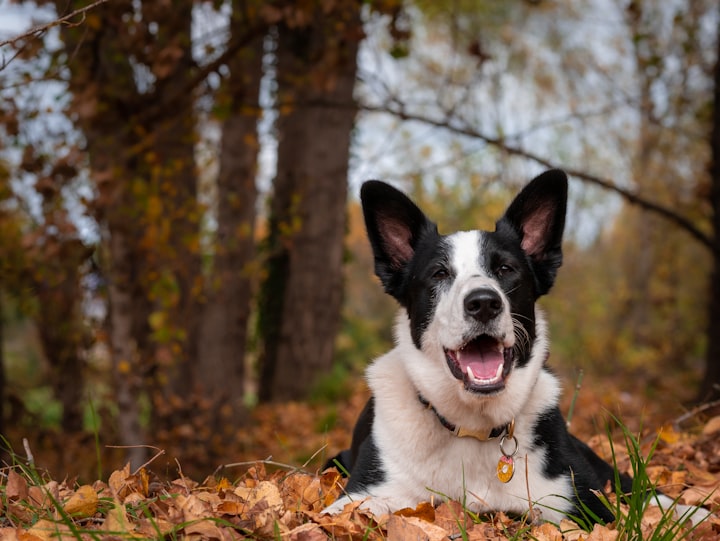
Shimmers of steam rose from the pavement, making the road look magical. Emma folded back the flap of the tent and stepped out. She stood and looked around. The early morning rain had changed the countryside. The rain had washed the dust and griminess away. The world was clean and new again. Sweet petrichor still filled the air, but as more of the rain evaporated, the thick, cloying heat of the day to come started to appear. The rain did, however, bring the promise of the coming Fall.
Emma set about packing their small amount of gear and loading it into the cargo bike trailer she had liberated from a bike shop several towns back, along with a bike trailer for Boy. It took most of one day to rig the trailers to pull behind the bike without tipping, but Emma eventually worked it out. Until that time, Boy trotted along beside her when she was riding, but the going was slow.
It wasn’t like there was any hurry to get anywhere. No one was waiting for her. Time didn’t matter. They ate when they were hungry and stopped for the night to sleep. Some days, since she had rigged up the trailer system, they moved quickly. It felt good to move. It felt to Emma as if she had a real purpose in life other than staying alive for Boy. Movement felt like she was accomplishing something. Boy rode when they were going at their fastest, but when going slower, he’d jump out and run alongside her. Movement felt good for him, too.
At first, Emma worried Boy would just wander away one day, and she’d be alone again. But he always came back. Sometimes he’d run out ahead of her or even double back, no doubt to take a better sniff at something he found interesting the first time they had passed by, but he always came back. She made the same promise to him. She’d always come back.
It was late summer. Their travel was hot and sometimes as mentally exhausting as it was physically, but those days were becoming fewer and fewer. The heat would eventually lift, and the ripe scent of autumn would prevail.
Emma finished loading the cargo trailer. BB—Before Boy—Emma didn’t see the need to carry much with her. She’d carry a small amount of food and water, a gun and ammo, some clothes, and her Walkman, but with so much lying around waiting to be used, she didn’t really see the need to stockpile. AB—After Boy—she started carrying more. Supplies were mostly in the city, and city streets were too hot that summer for Boy. Emma stopped looking for signs of life and changed her route. She traveled anywhere there was grass for Boy to walk on. That meant carrying more with her in case there was nothing to loot.
Emma knew she needed to make a decision. Summer was at its hottest, with August beating down on her every day. She was brown and well-muscled by this time and had to get new clothes a few times during their travels as her waistline shrank and arms got bigger. Summer wouldn’t last forever, she knew, and they couldn’t keep walking through the winter. A tent wouldn’t keep them warm, and she couldn’t pull enough stuff behind her in the cargo trailer to see them safely through winter.
Emma kept her eye out for a place to hole up. She didn’t know how long they would stay. Maybe after winter she would feel the need to find others again. Maybe after winter she would accept her solitude. Either way, she wanted to be set up for a long period of time.
Afternoon arrived, but Emma kept walking. She tossed bits of Vienna sausage to Boy as they walked, but she didn’t want to stop for lunch. There was plenty of time to stop later. They had just passed through a small, country town. By this time, months after the Uber Flu had killed everyone but Emma, or so it seemed to her, the bodies were no longer pungent, and most were reduced to bone. This town was no different. Most of the bodies were probably in their homes, but the occasional body she did find didn’t cause her to make a detour. It was the norm now.
Emma and Boy had walked for another hour—it was too hot to ride—and were just coming over a rise in the road when the afternoon sunshine revealed a field covered in splats of yellow, orange, and red. To Emma, the smears of color looked like a Van Gogh painting. She couldn’t remember seeing anything quite so breathtaking in her life.
There was no wind, yet the flowers seemed to sway gently. Obviously, the summer storm that morning had been a saving grace for the flowers. They looked plump and fresh, happy.
Emma hurried down the road towards the field of flowers. Marigolds, she saw, as she got closer. They had to have been planted purposely. She couldn’t recall ever seeing wild marigolds, though she supposed it was possible. There was a small house at the end of the field, nestled in a copse of pines. The house had an American flag on a pole in the front yard. The white siding seemed stark in comparison to the bursts of colors around it, but it was neat and clean and promising.
Emma turned and looked around. There were no other houses nearby, and the area was flat enough to allow visibility, while the trees provided shade and a wind barrier. This could be their winter home.
Emma turned up the long, narrow driveway, pushing the bike alongside. Boy had already run ahead. It seemed as if he had decided this was home, too.
Parking the bike in the shady yard, Emma slowly approached the raised front porch. Before climbing the steps, she went around the side of the small two-story house to see what was behind it. There was a large, plowed, empty plot of land, probably a large garden at one time, and a barn further back at the edge of what was probably the property line. The barn was red. It reminded her of the barn where her story had almost ended.
Returning to the front, Emma mounted the wooden steps and approached the front door. The porch looked like every farmhouse porch depicted on TV. There was even a porch swing off to one side. She could see inside the house as she walked up. It looked tidy, if not a bit old-fashioned. The door had a knocker on it. Tentatively, she knocked. She felt foolish knocking on the door of an empty world, but some habits die hard. There was no answer, nor was she expecting one, so she tested the doorknob and it turned. It never occurred to her that it would be locked. This looked like the kind of place you didn’t need to lock doors.
Inside, the house was cool with shade compared to the unrelenting sun outside. The house smelled dusty and warm but didn’t smell like a body. Emma quickly checked the kitchen, living area, mudroom, and bathroom, then took two steps at a time to check out the 2 small bedrooms on the second floor. She found the house empty of animals or the remains of people. Returning to the living room, she took a closer look. The house appeared to be that of an older person or more likely a couple. Hand-crocheted doilies were draped over the backs of the chairs and couch. The TV Guide was sitting neatly next to the remote on the coffee table, and a half-dozen coasters were stacked, ready for use. The walls were covered with pictures in unmatched frames: Pictures of children laughing, children posed stiffly and awkwardly, parents beaming with pride, weddings, birthday parties, and graduations. Some of the photos were black and white and their subjects reminded Emma of members of the Mickey Mouse Club. Hair was perfectly coiffed, clothes ironed and stainless, black patent leather shoes shiny. As Emma worked her way around the room, the pictures presented as a time capsule. From black and white, the pictures became color. Here was a woman wearing a paisley pantsuit set, her hair piled high on her head. Further on, the same woman was wearing hotpants and boots, laughing at what was obviously a party. The other party-goers were dressed similarly. The men wore leisure suits with too-wide lapels, shirts unbuttoned, gold chains nestled in hairy chests. Emma wondered if this couple had been swingers. She remembered hearing about parties where the men would drop their keys into a bowl, and at the end of the night, the women would grab a set of keys and go home with whoever owned them.
Many of the pictures had been taken outside, in the very field of marigolds Emma could see out of the open front door. This family seemed to farm marigolds. She didn’t know that was a thing. Boy ran in that same front door and made himself at home on the couch.
The far end of the room depressed her. The pictures were obviously newer. Children were grown and had children of their own, and some of them had children, too. The woman, now unrecognizable, sat in a wheelchair, staring vacantly into the camera. Her expression made her look startled, but Emma recognized that same look her grandmother wore shortly before she died.
On an end table, by the “his” chair of the pair of matching his and hers recliners, was a stack of pictures that showed a grieving family gathered around a gravesite. The old man in the picture was small and bent nearly double, but he stood strong on his own. His face was expressionless. He no longer seemed to care about his surroundings.
Looking around, Emma knew she would have to move the pictures at some point. That life story wasn’t hers, and those who did own that legacy were no longer around.
Emma took stock, rapidly making lists in her head about what to get, what to look for, and what she could jury rig. It was likely the house was on well water. She had noticed a cover of some sort by the side of the house, like a manhole cover, only not flush on the ground. If she could find a generator, she might even have access to running water. She tried the faucet in the kitchen sink. A small stream of water flowed out, discolored by the pipes and lacking pressure. She’d investigate the well later.
Emma noticed a door at the far side of the kitchen and opened it. Now I’ll find the man, she thought. Boy came to investigate with her. She felt better having him there. Out of habit, she flicked the light switch on the wall, but nothing happened. She pulled her headband flashlight out of her pocket, put it on, and headed down a steep set of stairs. It was a cool, dry basement. A washer and dryer pair were up against one wall, useless now. The other side had a workbench and tools. His and hers chores. Best of all, though, were the shelves lining the two remaining walls of the basement. Someone had loaded the shelves with jar after jar of home-canned food.
Jackpot!
If she had any doubts, they flew out the window. This was where she was going to winter.
Happy, feeling hopeful once again, Emma went back upstairs and started making the place her own. Boy smiled in approval, it seemed, tongue hanging out as he panted contently. He was tired, she could see, and it was time to settle down. She was tired, too. She went into the largest bedroom and pulled off the bedding. She found a fresh set in a hall closet and made the bed.
Later, she would pick something from the basement larder and have a feast. It would be a celebration.
She was home.
About the Creator
Mayra Martinez
Just another writer . . .






Comments
There are no comments for this story
Be the first to respond and start the conversation.